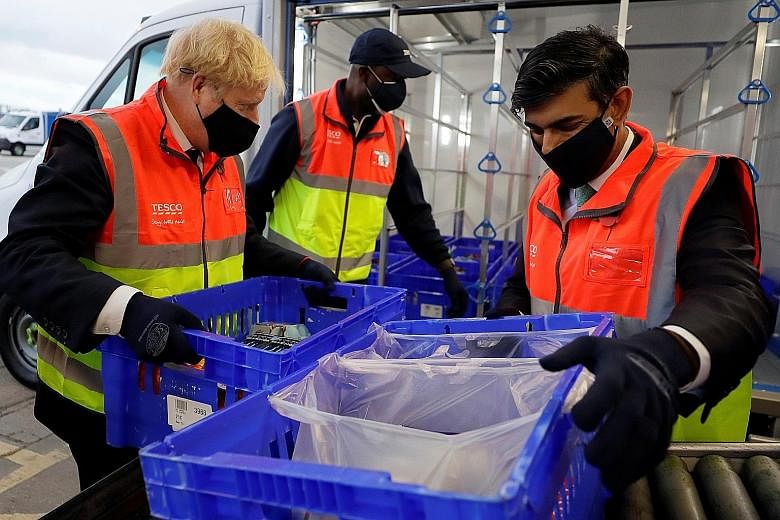LONDON • British Finance Minister Rishi Sunak yesterday said there would be no return to austerity in a spending plan he will announce on Wednesday, even as the coronavirus crisis pushes the country's debt further above £2 trillion (S$3.5 trillion).
Mr Sunak, who has rushed out massive government spending increases and tax cuts equating to about 10 per cent of economic output, said that he would announce "quite a significant" increase in funding for public services.
"You will not see austerity next week," Mr Sunak told Sky News, saying his priority in the one-year spending plan was to fight the health and economic crises.
More than £3 billion will be set aside in extra help for the health service to cope with the impact of the pandemic, including funds to ease wait times and to care for people with mental health issues.
Economists think Britain will borrow about £400 billion this year, approaching 20 per cent of gross domestic product, the most since World War II.
It would be nearly double the hit from the global financial crisis, which took a decade to work down, and some lawmakers in Prime Minister Boris Johnson's Conservative Party want more fiscal restraint now.
"The Chancellor faces a cat's cradle of competing pressures," said Mr Steve Baker, an influential Conservative who sits on the House of Commons Treasury Committee.
"It's imperative that he lets the public know we continue to believe in sound money and balanced budgets. And yet it's essential that he doesn't deliver a hammer blow by contracting spending," he added.
Mr Sunak also said he would announce longer-term measures to boost infrastructure spending, part of Mr Johnson's promise to spread economic growth to regions that lag behind London and the south-east.
Britain also faces the risk of an economic shock if it fails to strike a trade deal with the European Union in time for the Dec 31 expiry of its post-Brexit transition. Mr Sunak said although the government wanted to get a deal, the short-term impact of not doing so would pale in comparison with the massive hit from the Covid-19 pandemic.
He said forecasts to be published on Wednesday would show the "enormous strain" on the economy and that now was not the time to cut back on spending or to raise taxes.
"Once we get through this crisis we need to think more about returning to a more normal path," the Chancellor told Times Radio.
"But as of now, we are able to do what we need to do and we are able to do that at an affordable cost," he said.
Though yields on government debt remain close to record lows, Mr Sunak is expected to announce a freeze on public sector pay to offset some of his spending.
"When we think about public pay settlements, I think it would be entirely reasonable to think about those in the context of the wider economic climate," he said.
One contentious area for potential savings is overseas aid, set by law at a minimum of 0.7 per cent of gross national income. Last week, Mr Johnson refused to deny that the threshold might be temporarily squeezed.
That may please fiscal hawks, but former ministers, including Mr Tobias Ellwood, deplore the idea as diminishing British influence just when it is trying to portray a global outlook.
"I hope the Chancellor does not choose to balance the books on the back of the world's poorest," said Ms Harriett Baldwin, a former development minister.
BLOOMBERG, REUTERS

